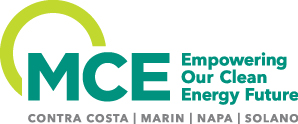Walking the Talk: How MCE Implements Equity Strategies
Community Choice Aggregation (CCA) agencies like MCE are committed and required to follow a universal access requirement and opt-out structure for customer enrollment. While this ensures equality in energy access, it does not guarantee equity. In other words, MCE has the opportunity to serve everyone in its service area with the same quality of service, but must not rest there if we want to go beyond this uniformity and address historical inequalities due to socio-economic striation, or the additional linguistic, cultural, and geographic barriers that challenge certain segments of our communities. Given MCE’s public governance, mission, and direct connection to our community, our equity efforts are both self-motivated and as diverse as the communities we serve.
Supplier Diversity General Order 156: Promoting Vendor Opportunity
General Order (GO) 156 is a California Public Utilities Commission (CPUC) program that encourages California investor-owned utilities (IOUs) to provide a fair proportion of total utility contracts and subcontracts to businesses that meet diversity qualifications. GO 156-certified suppliers are listed in a Clearinghouse database to provide easy access to qualified contractors. IOUs and CCAs like MCE can all access this data. MCE is now using the Clearinghouse to identify potential bidders for supplier solicitations.
In addition, in 2018 MCE began requesting that contractors voluntarily disclose their GO 156 certification status and efforts to work with disabled veterans and LGBT business enterprises for power purchase agreements, Feed-In Tariffs, and customer programs contracting.
Case Study: Evaluating Equity
From this survey, MCE found that 23% of respondents either self-identified as certified under GO 156 or use subcontractors that are certified under GO 156. MCE also found that 100% of respondents with labor-related jobs paid prevailing wages, 77% have initiatives to promote diversity, and 45% support or use apprenticeship programs.
Challenges: Commitment to Equity and Compliance
In looking at ways MCE can advance supplier diversity, it is important to highlight a central tension between GO 156 and Proposition 209. GO 156 seeks to collect information on personal identities, including if business owners self-identify as women, minority, disabled veteran, or LGBT. As a public agency, MCE complies with California Proposition 209, which reads “[t]he State shall not discriminate against, or grant preferential treatment to, any individual or group on the basis of race, sex, color, ethnicity, or national origin in the operation of public employment, public education, or public contracting.” It defines the State as “any city, county, city and county…or any other political subdivision or governmental instrumentality of or within the State,” which extends to public agencies like MCE.
This means that MCE can ask to collect voluntary information for GO 156 reporting purposes, but cannot use this information for preferential treatment in the decision-making purposes. MCE collects this information in an optional questionnaire to measure whether their procurement practices are facilitating workforce diversity within the confines of Proposition 209.
Walking this line often means voluntary work to pursue relevant information while ensuring compliance. However, MCE is committed to inclusion, representation, and the benefit of our diverse communities through democratic governance and intensive community engagement. These efforts align with, complement, and go beyond the CPUC’s General Order 156 supplier diversity efforts to ensure equity in this industry, while remaining compliant with state laws.






